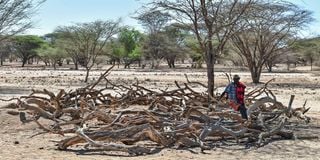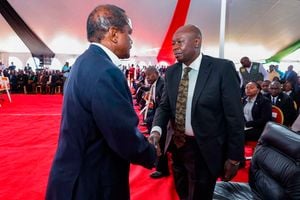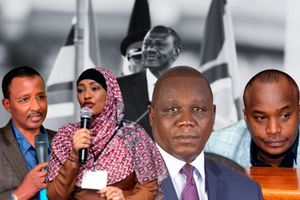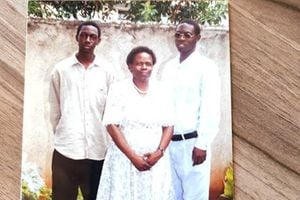Premium
What I learnt from Lodwar hell on earth posting

A man takes a break under a tree while sitting on a pile of firewood at a local rural school in Sopel village, near Lodwar town in Turkana County.
When I volunteered for service in the so-called Northern Frontier District — as the north of Kenya was known then — I did not realise that I would be sent to a place which, many years later, independent Kenya’s First President, Mzee Jomo Kenyatta, would describe as “hell on earth”.
Not many a young man of 19 years would have wanted to be “exiled” to the remote outpost of Lodwar in the Turkana District (now Turkana County) of north-west Kenya. But this was precisely where I found myself in 1948, when the powers that be at the British colonial secretariat in Nairobi decided that it was not to be Isiolo, Marsabit or Moyale, but the semi-desert inferno of Lodwar. For a moment I wondered what I had let myself into for by volunteering for a posting from the luxuriant comforts of Voi in the Coast Province.
I had no one to blame but myself!
The road journey from the bustling farming town of Kitale in the former White Highlands was anything but comfortable. To avoid the scorching daytime heat, one always travelled during the late evenings in a trader’s lorry loaded with sacks of posho (maize meal) and other supplies for the townsfolk, plus rations for government officials. The rest of the cargo consisted of the odd Turkana people returning to their manyattas on discharge from Kitale hospital, and sometimes army personnel returning home on leave.
Sleep in the lorry’s cramped cab was out of the question even though I managed to snatch a little more than 40 winks from time to time, while trying to listen to the driver’s running commentary on the road conditions and what fate awaited me!
The entry into Lodwar was very impressive indeed. With true military precision, a half-clad fully armed Turkana askari kanga (tribal policeman) was on sentry duty, challenging every in-coming vehicle entering Lodwar. Like other frontier stations, Lodwar was a Closed District and permits to enter had to be obtained in advance from either the Provincial Commissioner at Isiolo or the Lodwar District Commissioner, a concession not easily granted.
Government officials were, of course, exempt from this requirement. Another strict rule was that women from elsewhere were not allowed to enter this part of Kenya. It was mostly bachelors who were posted in Lodwar. A married official posted to Lodwar, had to leave his wife and family in Kitale or even Nairobi. For this, the European staff were paid a generous “separation allowance”, while the Asian staff were paid a much lower allowance despite being in a similar situation!
Shining in the bright sunlight
The daytime heat was punishing, and though embarrassed at first sight, I later got used to the sight of Turkana men walking unashamedly naked in the township, and even when entering our open-plan offices. The women, bare-breasted, but slightly more ‘modestly’ clad, wore a goatskin skirt, their bodies shining in the bright sunlight from the goats’ fat and blood they had applied all over!
Daniel, my cook from Taita, could not understand why I had brought him to this “horrible” place. He left for his Taita Hills home after a few months. I could hardly blame him for wanting to leave.
While the European officials enjoyed the luxury of a safari, we — the Goan administrative staff — spent endless hours in our offices, taking long walks in the evenings to relieve the boredom. On some of these walks, we often ran into many a ngoma (community dance) – a very colourful and enjoyable spectacle to witness. Sometimes, we also joined our European colleagues for a game of squash, later meeting them for a welcome drink of beer. This social “custom” was on a reciprocal basis.
Thanks to successive Provincial Commissioners, the Goan staff were given unofficial leave to go to Lake Rudolf (now Lake Turkana), at least once a month. I can recall many such trips when we joined the local fishermen at Fergusson’s Gulf and always ended up with a big catch of tilapia. On such trips, we also carried maize meal and tobacco for the “paupers camp” on the lakeshore. I have fond memories of the many trips to the lake, and especially the one occasion when my Goan colleagues dared me to pose with a Turkana belle!
The District Commissioner during my time was a bachelor who, having previously worked as a headmaster in Maasailand, now found himself in Turkana – a sort of ‘Lord of the Manor’. It was a manor he never wanted to leave and, in fact, never left until his retirement. DC Leslie Whitehouse gained fame by being Jomo Kenyatta’s jailor, and later a close friend of Kenya’s first President. Despite his fiery temper, I found him a thorough gentleman and always got on well with him. His DOs held him in awe!
While Lodwar and the Turkana people may not have been everyone’s cup of tea, I got to admire the resilience of these simple folk. Here were a people who inhabited one of the most barren and inhospitable areas; in worldly terms, possessed next to nothing (save for a few skinny goats), led a nomadic life, had no more than a portable hut to call home, and yet were so happy and seemingly content with their lot. They taught me a lot and have left a lasting mark on my life. To me at least, it was a privilege to serve these simple folk from whom I gained much.



